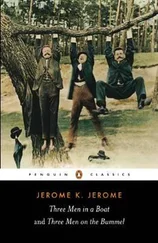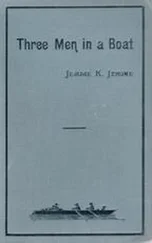Jerome Jerome - Three Men in a Boat (To Say Nothing of the Dog)
Здесь есть возможность читать онлайн «Jerome Jerome - Three Men in a Boat (To Say Nothing of the Dog)» — ознакомительный отрывок электронной книги совершенно бесплатно, а после прочтения отрывка купить полную версию. В некоторых случаях можно слушать аудио, скачать через торрент в формате fb2 и присутствует краткое содержание. Жанр: Юмористическая проза, Классическая проза, на английском языке. Описание произведения, (предисловие) а так же отзывы посетителей доступны на портале библиотеки ЛибКат.
- Название:Three Men in a Boat (To Say Nothing of the Dog)
- Автор:
- Жанр:
- Год:неизвестен
- ISBN:нет данных
- Рейтинг книги:3 / 5. Голосов: 1
-
Избранное:Добавить в избранное
- Отзывы:
-
Ваша оценка:
- 60
- 1
- 2
- 3
- 4
- 5
Three Men in a Boat (To Say Nothing of the Dog): краткое содержание, описание и аннотация
Предлагаем к чтению аннотацию, описание, краткое содержание или предисловие (зависит от того, что написал сам автор книги «Three Men in a Boat (To Say Nothing of the Dog)»). Если вы не нашли необходимую информацию о книге — напишите в комментариях, мы постараемся отыскать её.
Three Men in a Boat (To Say Nothing of the Dog) — читать онлайн ознакомительный отрывок
Ниже представлен текст книги, разбитый по страницам. Система сохранения места последней прочитанной страницы, позволяет с удобством читать онлайн бесплатно книгу «Three Men in a Boat (To Say Nothing of the Dog)», без необходимости каждый раз заново искать на чём Вы остановились. Поставьте закладку, и сможете в любой момент перейти на страницу, на которой закончили чтение.
Интервал:
Закладка:
The grocer's was full. An old woman we met in the shop then kindly took us along with her for a quarter of a mile, to a lady friend of hers, who occasionally let rooms to gentlemen.
This old woman walked very slowly, and we were twenty minutes getting to her lady friend's. She enlivened the journey by describing to us, as we trailed along, the various pains she had in her back.
Her lady friend's rooms were let. From there we were recommended to No. 27. No. 27 was full, and sent us to No. 32, and 32 was full.
Then we went back into the high road, and Harris sat down on the hamper and said he would go no further. He said it seemed a quiet spot, and he would like to die there. He requested George and me to kiss his mother for him, and to tell all his relations that he forgave them and died happy.
At that moment an angel came by in the disguise of a small boy (and I cannot think of any more effective disguise an angel could have assumed), with a can of beer in one hand, and in the other something at the end of a string, which he let down on to every flat stone he came across, and then pulled up again, this producing a peculiarly unattractive sound, suggestive of suffering.
We asked this heavenly messenger (as we discovered him afterwards to be) if he knew of any lonely house, whose occupants were few and feeble (old ladies or paralysed gentlemen preferred), who could be easily frightened into giving up their beds for the night to three desperate men; or, if not this, could he recommend us to an empty pigstye, or a disused limekiln, or anything of that sort. He did not know of any such place-at least, not one handy; but he said that, if we liked to come with him, his mother had a room to spare, and could put us up for the night.
We fell upon his neck there in the moonlight and blessed him, and it would have made a very beautiful picture if the boy himself had not been so over-powered by our emotion as to be unable to sustain himself under it, and sunk to the ground, letting us all down on top of him. Harris was so overcome with joy that he fainted, and had to seize the boy's beer-can and half empty it before he could recover consciousness, and then he started off at a run, and left George and me to bring on the luggage.
It was a little four-roomed cottage where the boy lived, and his mother- good soul!-gave us hot bacon for supper, and we ate it all-five pounds-and a jam tart afterwards, and two pots of tea, and then we went to bed. There were two beds in the room; one was a 2ft. 6in. truckle bed, and George and I slept in that, and kept in by tying ourselves together with a sheet; and the other was the little boy's bed, and Harris had that all to himself, and we found him, in the morning, with two feet of bare leg sticking out at the bottom, and George and I used it to hang the towels on while we bathed.
We were not so uppish about what sort of hotel we would have, next time we went to Datchet.
To return to our present trip: nothing exciting happened, and we tugged steadily on to a little below Monkey Island, where we drew up and lunched. We tackled the cold beef for lunch, and then we found that we had forgotten to bring any mustard. I don't think I ever in my life, before or since, felt I wanted mustard as badly as I felt I wanted it then. I don't care for mustard as a rule, and it is very seldom that I take it at all, but I would have given worlds for it then.
I don't know how many worlds there may be in the universe, but anyone who had brought me a spoonful of mustard at that precise moment could have had them all. I grow reckless like that when I want a thing and can't get it.
Harris said he would have given worlds for mustard too. It would have been a good thing for anybody who had come up to that spot with a can of mustard, then: he would have been set up in worlds for the rest of his life.
But there! I daresay both Harris and I would have tried to back out of the bargain after we had got the mustard. One makes these extravagant offers in moments of excitement, but, of course, when one comes to think of it, one sees how absurdly out of proportion they are with the value of the required article. I heard a man, going up a mountain in Switzerland, once say he would give worlds for a glass of beer, and, when he came to a little shanty where they kept it, he kicked up a most fearful row because they charged him five francs for a bottle of Bass. He said it was a scandalous imposition, and he wrote to the Times about it.
It cast a gloom over the boat, there being no mustard. We ate our beef in silence. Existence seemed hollow and uninteresting. We thought of the happy days of childhood, and sighed. We brightened up a bit, however, over the apple-tart, and, when George drew out a tin of pine-apple from the bottom of the hamper, and rolled it into the middle of the boat, we felt that life was worth living after all.
We are very fond of pine-apple, all three of us. We looked at the picture on the tin; we thought of the juice. We smiled at one another, and Harris got a spoon ready.
Then we looked for the knife to open the tin with. We turned out everything in the hamper. We turned out the bags. We pulled up the boards at the bottom of the boat. We took everything out on to the bank and shook it. There was no tin-opener to be found.
Then Harris tried to open the tin with a pocket-knife, and broke the knife and cut himself badly; and George tried a pair of scissors, and the scissors flew up, and nearly put his eye out. While they were dressing their wounds, I tried to make a hole in the thing with the spiky end of the hitcher, and the hitcher slipped and jerked me out between the boat and the bank into two feet of muddy water, and the tin rolled over, uninjured, and broke a teacup.
Then we all got mad. We took that tin out on the bank, and Harris went up into a field and got a big sharp stone, and I went back into the boat and brought out the mast, and George held the tin and Harris held the sharp end of his stone against the top of it, and I took the mast and poised it high up in the air, and gathered up all my strength and brought it down.
It was George's straw hat that saved his life that day. He keeps that hat now (what is left of it), and, of a winter's evening, when the pipes are lit and the boys are telling stretchers about the dangers they have passed through, George brings it down and shows it round, and the stirring tale is told anew, with fresh exaggerations every time.
Harris got off with merely a flesh wound.
After that, I took the tin off myself, and hammered at it with the mast till I was worn out and sick at heart, whereupon Harris took it in hand.
We beat it out flat; we beat it back square; we battered it into every form known to geometry-but we could not make a hole in it. Then George went at it, and knocked it into a shape, so strange, so weird, so unearthly in its wild hideousness, that he got frightened and threw away the mast. Then we all three sat round it on the grass and looked at it.
There was one great dent across the top that had the appearance of a mocking grin, and it drove us furious, so that Harris rushed at the thing, and caught it up, and flung it far into the middle of the river, and as it sank we hurled our curses at it, and we got into the boat and rowed away from the spot, and never paused till we reached Maidenhead.
Maidenhead itself is too snobby to be pleasant. It is the haunt of the river swell and his overdressed female companion. It is the town of showy hotels, patronised chiefly by dudes and ballet girls. It is the witch's kitchen from which go forth those demons of the river-steam-launches. The London Journal duke always has his "little place" at Maidenhead; and the heroine of the three-volume novel always dines there when she goes out on the spree with somebody else's husband.
Читать дальшеИнтервал:
Закладка:
Похожие книги на «Three Men in a Boat (To Say Nothing of the Dog)»
Представляем Вашему вниманию похожие книги на «Three Men in a Boat (To Say Nothing of the Dog)» списком для выбора. Мы отобрали схожую по названию и смыслу литературу в надежде предоставить читателям больше вариантов отыскать новые, интересные, ещё непрочитанные произведения.
Обсуждение, отзывы о книге «Three Men in a Boat (To Say Nothing of the Dog)» и просто собственные мнения читателей. Оставьте ваши комментарии, напишите, что Вы думаете о произведении, его смысле или главных героях. Укажите что конкретно понравилось, а что нет, и почему Вы так считаете.












![Helen Rowland - The Widow [To Say Nothing of the Man]](/books/752764/helen-rowland-the-widow-to-say-nothing-of-the-man-thumb.webp)